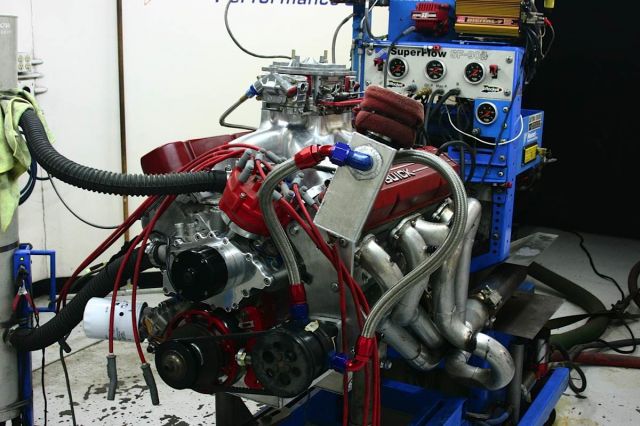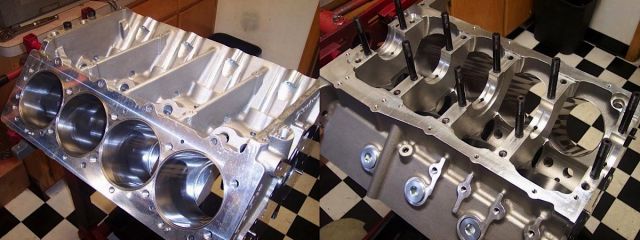Buick big-block engines don’t get much love when it comes performance modifications. While the 1970 Buick GSX is one of the most gorgeous musclecars of all time, the 455 engine has problems with thin-wall castings, poor oiling and a tiny camshaft. Not many Buick BBs ended up in race cars.
 Bruce Kent, however, campaigns a pretty stout Buick engine in his ’73 Apollo. It was making 880 horsepower when the block cracked again. Instead of slapping in another sleeve, he chose to build the next project around a new TA Performance aluminum 455 Buick block. This block corrects many of the stock block’s well-documented shortcomings, as they often needed block filler, stud girdles and dry-sump oiling to survive any serious modifications. Even though the TA alloy block weighs about the same as a stock iron block, it’s extremely beefy and features priority oiling. It also comes with Ford 3-inch main bearings (smaller than the stock 3.250) and 2.125 cam bearings, which are much bigger than stock 1.785 to allow a larger base-circle cam.
Bruce Kent, however, campaigns a pretty stout Buick engine in his ’73 Apollo. It was making 880 horsepower when the block cracked again. Instead of slapping in another sleeve, he chose to build the next project around a new TA Performance aluminum 455 Buick block. This block corrects many of the stock block’s well-documented shortcomings, as they often needed block filler, stud girdles and dry-sump oiling to survive any serious modifications. Even though the TA alloy block weighs about the same as a stock iron block, it’s extremely beefy and features priority oiling. It also comes with Ford 3-inch main bearings (smaller than the stock 3.250) and 2.125 cam bearings, which are much bigger than stock 1.785 to allow a larger base-circle cam.

Two views of the TA Performance aluminum block. Note the stout construction and Ford-sized main bearings. (Photos courtesy of Tri-Shield Performance)
“I had three priorities with this engine,” reports Kent. “Horsepower, simplicity and cost.”
Kent carried over the Moldex 4.5-inch-stroke crank and GRP rods but had to order custom 4.380-inch CP pistons to achieve 15:1 compression ratio and total displacement of 540ci. TA supplies a billet-steel cam core to which Scott Brown at Competition Components applied a top-secret grind. Kent did have to notch a couple of rods about .125-inch to clear the high-lift cam. The TA block uses a stock Buick oil pump but Kent installed a trick SRE Performance Fabrications oil pan.
 The cylinders breathe through TA Stage 4 heads that have been modified by Al Dicksen of HRD Racing Heads and Mikeo at Performance Machine. Peak flow rate is 377cfm intake and 314cfm exhaust. Since the Buick big-block isn’t that popular with aftermarket speed merchants, owners often have to get creative. One trick is to adapt Dodge big-block parts as the bore spacing is almost identical. The intake on Kent’s Buick is actually a Dave Koffel-designed B1 manifold modified to fit the TA heads. On top is a Quick Fuel 1250cfm carb.
The cylinders breathe through TA Stage 4 heads that have been modified by Al Dicksen of HRD Racing Heads and Mikeo at Performance Machine. Peak flow rate is 377cfm intake and 314cfm exhaust. Since the Buick big-block isn’t that popular with aftermarket speed merchants, owners often have to get creative. One trick is to adapt Dodge big-block parts as the bore spacing is almost identical. The intake on Kent’s Buick is actually a Dave Koffel-designed B1 manifold modified to fit the TA heads. On top is a Quick Fuel 1250cfm carb.
Kent’s new bullet clicked off a best of 954.5 horsepower at 7,200 rpm on the Westech dyno. Peak torque came in at 771 lb-ft. The engine will now go back into the Apollo–which was Buick’s version of the Chevy Nova–for another year of racing, including a trip to the Buick Nationals. He ran a best of 9.58 @ 143mph in a car that weighed 3,700 pounds. Now, with the new engine and a 300-pound weight reduction in the Apollo, Kent has a goal of 8.90 and 150mph.

















